








































 
|
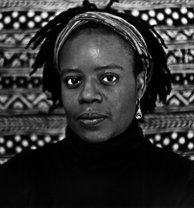 Yvonne
Welbon. . . Yvonne
Welbon. . .
Yvonne Welbon, an award-winning independent
filmmaker, originally from Chicago, attended Vassar College in
Poughkeepsie, New York. Thereafter, she spent six years in
Taipei, Taiwan, where she taught English, learned Mandarin
Chinese, and founded and published a premiere arts magazine for
five years.
Welbon returned to the United States and
enrolled in the School of the Art Institute of Chicago and
obtained a Master of Fine Arts with a concentration in film and
video in 1994. At present, she is a doctoral candidate at
Northwestern University in Evanston, Illinois. Welbon's current
project is Sisters in Cinema, a documentary, doctoral
dissertation, and website.
Her work as a filmmaker is experimental and often
autobiographical, exploring identity through memory, history,
culture, race, and sexuality. Her films illustrate our need to
recognize our heritage, history and our places in society as
individuals.
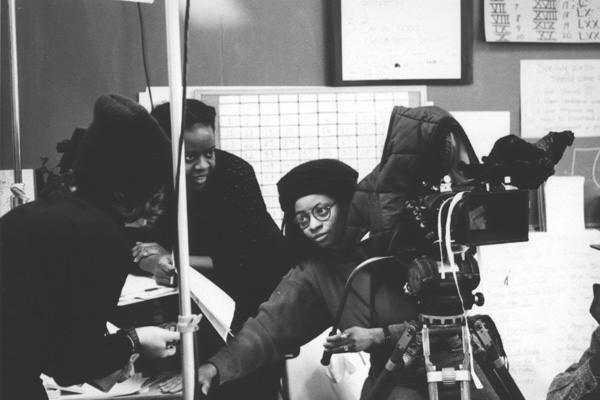 Yvonne
Welbon's films and videos work to create a stronger media
presence for African American women. Her award winning films
have been screened on cable, public television, at universities
and community centers, and in film and video festivals around
the world. In 1997 she was awarded an Illinois Arts Council
Fellowship in Media Arts to continue her work in media
production. Yvonne
Welbon's films and videos work to create a stronger media
presence for African American women. Her award winning films
have been screened on cable, public television, at universities
and community centers, and in film and video festivals around
the world. In 1997 she was awarded an Illinois Arts Council
Fellowship in Media Arts to continue her work in media
production.
She has written, directed and produced a
number of independent films and videos. Monique (1991) is an
experimental autobiographical film about her first painful
encounter with racism. It was awarded the prize for Best
Documentary at the 17th Festival of Illinois Film and Video
Artists.
|
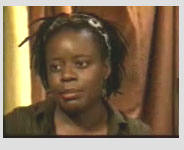
Interview with Yvonne Welbon
|
|
The Cinematic Jazz of Julie Dash
(1992-3), presents an inspiring interview with the pioneering
filmmaker. Julie Dash speaks about her background, training,
vision and struggle to bring Daughters of the Dust to the
American movie screen. The Cinematic Jazz of Julie Dash has been
acquired and added to the collections of numerous university
libraries in the United States and abroad.
Sisters in the Life: First Love (1993), is a black
lesbian love story which was screened at a myriad of festivals
including the San Francisco, Chicago, New York and Hong Kong Gay
and Lesbian Film Festivals. The film offers one of the only
media portrayals of a young black lesbian coming to terms with
her sexuality.
Missing Relations (1994) is an autobiographical
experimental dramatic documentary which explores loss and denial
in an African American family. Missing Relations was screened at
the Mill Valley Film Festival, the Atlanta Black Arts Festival,
and broadcast on the Chicago based PBS affiliate program Image
Union. It was awarded a certificate of merit at the Chicago
International Film Festival. Missing Relations was also
distinguished as one of the most outstanding MFA thesis projects
at the School of the Art Institute of Chicago. Welbon was
honored with an MFA Traveling Fellowship for the film in 1994.
Yvonne Welbon was granted P.O.V. finishing funds, a Sidney
Poitier Emerging Filmmaker Fellowship and a Center for New
Television/NEA-AFI Regional Fellowship for Remembering Wei Yi
fang, Remembering Myself... (1995). The award winning
documentary is an autobiographical fi`lm about her experiences as
an African American woman living in Taiwan for six years. The
film was broadcast on the national Public Television series P.O.V. in 1996. Remembering Wei Yi fang, Remembering
Myself... won a Silver Hugo at Intercom: The Chicago
International Film Festival, and was named Best Film/Video on
Matters Relating to the Black Experience at the 11th Black
International Cinema Festival in Berlin.
Welbon is currently working on a new documentary. Sisters in
Cinema is the first documentary of its kind. It gives voice
to African American women directors and serves to illuminate a
history of independent filmmaking that has remained hidden for
too long. In the summer of 1997, Welbon produced and directed a
segment about her work-in-progress for Split Screen, a program
about independent filmmakers produced by John Pierson. The
segment highlighted the films of black women directors Eloyce
Gist, Zora Neale Hurston, Julie Dash, Darnell Martin and
Bridgett Davis. The Split Screen segment was cablecast on Bravo
in 1997.
In addition to her own work, Welbon has served in various
producing capacities on a number of other projects. She was
Associate Producer/Production Manager on the ITVS funded film
Mother of the River (1994) directed by Zeinabu Irene Davis.
Among her other credits are: Production Manager for the film
adaptation of the Ernest Hemingway short-story A Clean
Well-lighted Place (1994) directed by Allan Siegel; Coordinating
Producer of the Museums in the Park (1993), a video documentary
commissioned by and about nine Chicago museums including the Art
Institute, the Field Museum, the Shedd Aquarium and the Mexican
Fine Arts Center; and Associate Producer/Assistant Director on
Compensation (1998), a short feature film which parallels the
lives of a deaf African American woman at the turn of the
century in the early 1900s and one living today in the late
1990s.
Yvonne Welbon's writings on black women filmmakers have been
published in the Independent and other publications. They
include Calling the Shots: Black Women Directors Take the Helm,
Determined to Create a Presence: Black Lesbian Film and Video
Artists, The Marketing, Distribution and Exhibition of Daughters
of the Dust: A Case Study, and Sisters in the Life: Black
Lesbian Film and Video Artists. Her publications have been used
widely in film and video courses at a number of universities.
Welbon is also the recipient of grants and awards for her
scholarship. In 1994 she was awarded a graduate fellowship at
Northwestern University in Evanston, Illinois, for study toward
a doctorate in Radio/Television/Film. In 1995, she was awarded a
fellowship for graduate study by the Illinois Consortium for
Educational Opportunity program. In 1997 she received a
Dissertation Year Grant from Northwestern University. In
addition, Welbon has completed all course work for a certificate
in Telecommunications, Policy, Management and Science.
Yvonne Welbon received a B.A. in History from Vassar College in
1984. Upon graduation, she went on to study Chinese in Taipei,
Taiwan at the National Taiwan Normal University. She learned to
read, write and speak Mandarin Chinese. At the age of 23, she
founded and began to publish a premier English language city
magazine in Taipei, Taiwan. After five years, developing the
magazine from an eight-page quarterly to a 52 page monthly, she
returned to the United States to pursue graduate study in film
and video.
In 1994 she received a MFA from the School of the Art Institute
of Chicago. She has completed all course work toward a doctorate
in Radio/TV/Film at Northwestern University. Her dissertation,
also called Sisters in Cinema, offers a historical overview of
the lives and the films of African American women directors from
the early part of the century to today. It is her intention to
create a strong record documenting African American women within
the history of film. With the publication of the dissertation
and the broadcast of the documentary, this history will, perhaps
for the first time, be made easily available to the general
population.

Source: Sisters In Cinema:
http://www.sistersincinema.com/filmmakers/ywelbon/bio.html
Women Make Movies:
http://www.wmm.com/catalog/_makers/fm375.htm
|
|
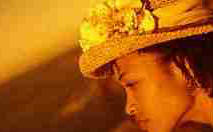
|

African American Lesbian Produced Film, Video, and Multimedia
Resource
List
Click Here To
Purchase Films By Yvonne Welbon
Black Lesbian
Film and Video Art: Feminism Studies, Performance Studies
|
|
The Following Are Streaming Video Clips
from Yvonne Welbon's "Sisters in Cinema" Documentary

Julie Dash - 31 sec.

Dianne
Houston - 44 sec.
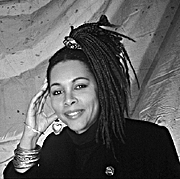
The Cinematic Jazz of Julie Dash
From her innovative short works to her critically acclaimed
feature debut Daughters of the Dust, the films of Julie Dash
have broken new cinematic ground and redefined black women's
images on screen. In this wide-ranging interview, Dash talks
about her background, development and approach to movie making,
as well as the struggles, victories and interdependence of
African American women filmmakers. Excerpts from early films and
Daughters of the Dust, the dramatic feature about different
generations of South Carolina sea islanders which has thrilled
audiences across the nation, underscore the originality of this
immensely gifted artist.
|
|

|